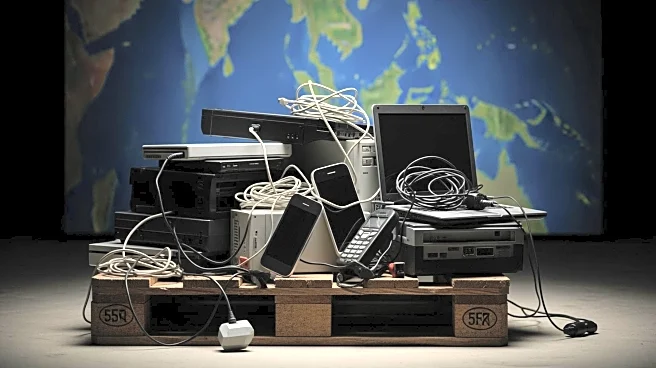What's Happening?
A report by the Basel Action Network has revealed that millions of tons of electronic waste from the United States are being exported to Southeast Asia, where countries are often ill-equipped to manage
the hazardous materials. The investigation identified at least 10 U.S. companies involved in exporting used electronics, contributing to what the report describes as a 'hidden tsunami' of e-waste. This waste includes discarded devices such as phones and computers, which contain toxic metals like lead, cadmium, and mercury. The global production of e-waste is increasing rapidly, with projections indicating a rise from 62 million metric tons in 2022 to 82 million by 2030. The report highlights that approximately 33,000 metric tons of used electronics are shipped monthly from U.S. ports, often under misleading trade codes to evade detection.
Why It's Important?
The export of e-waste from the U.S. to Southeast Asia poses significant environmental and health risks. Many of these countries lack the infrastructure to safely process hazardous waste, leading to pollution and health hazards for local communities. The practice undermines international efforts to regulate waste trade, as evidenced by the Basel Convention, which aims to prevent the transfer of hazardous waste to countries unable to manage it. The report raises concerns about the effectiveness of industry certifications like R2V3, which are intended to ensure responsible recycling practices. The situation highlights the need for stricter enforcement of e-waste regulations and greater accountability for companies involved in the export of electronic waste.
What's Next?
The report's findings may prompt increased scrutiny of e-waste exports and pressure on U.S. companies to adhere to international waste management standards. There could be calls for legislative action to close loopholes that allow the misclassification of e-waste shipments. Additionally, Southeast Asian countries may seek to strengthen their regulations and enforcement mechanisms to prevent illegal imports. Environmental groups and policymakers might advocate for the U.S. to ratify the Basel Convention, aligning its practices with global standards to mitigate the environmental impact of e-waste.
Beyond the Headlines
The issue of e-waste export underscores broader ethical concerns about environmental justice and the responsibility of developed nations to manage their waste sustainably. It highlights the disparity between countries with advanced waste management systems and those struggling with inadequate infrastructure. The situation may also drive innovation in recycling technologies and encourage the development of circular economy models that prioritize the reuse and refurbishment of electronic devices.










